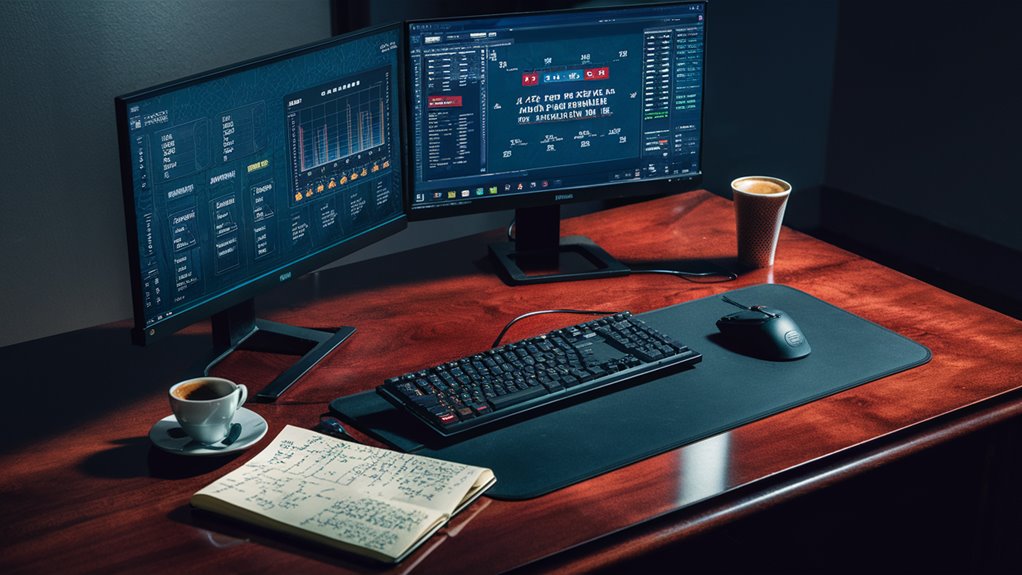
Win at Poker Like a Pro: Key Strategy Guide

Basic Skills for Pro Poker
Playing smart and thinking ahead are key for top poker. Knowing pot odds and value bets helps players make good choices. Top pros manage their money well, often keeping 20-30 buy-ins for cash games to handle ups and downs. 더 많은 정보 보기
Top Tech Skills
Mastering your position gives big edges by watching others before you act. Smart table choice finds easy games and skips hard ones. Pro players use tracking tools like PokerTracker to find patterns and use them.
Building a Strong Mind for Poker
Mental routines and good tilt control put the best players above the rest. Staying cool in bad times and sharp during long games helps win rates. Pros keep learning new layers of strategy, getting better all the time.
Must-Have Tools for Winning
- Math tools
- Strategy charts for positions
- Money tracking tools
- Mind exercises
- Review systems for played hands
Knowing and using these basics with good habits leads to lasting poker wins. Practice a lot, analyze well, and adapt strategies to stay top-level.
Being the Best at Poker Position Play
Best Position Play in Poker: Full Strategy Guide
Basics of Table Position
Your spot at the table is a big deal in cash games and matches. Playing later lets you see other moves first, making it easier to play well and control the pot size.
Deep Dive into Position Play
Play from Early Position
Early spots mean you need strong cards as you’re more open to risks. Pick hands well and play tight from these spots. Good starting hands help beat the early spot.
Thoughts on the Middle Position
The middle spot lets you play a bit looser but be smart. Watch players who still have to act. This spot lets you mix up play staying safe.
Power of the Late Position
The dealer and near spots let you control the game:
- Make easy steals
- Play weaker hands well
- Manage the pot size smartly
- Use what you know from others
Using Positions Well
Choosing based on position changes how you play each hand. Playing last lets you make clever calls and raises even with okay cards. On the other hand, in early spots, sometimes fold hands you might play from another spot. Knowing positions well turns tough spots into chances to win more while losing less.
Read Your Opponents Well
Knowing Opponents’ Moves in Poker: Full Guide
See How Others Act
Poker tells show habits that can give you an edge, no matter your spot. While good position helps make structural plays, spotting real moves and signs often decides big deals.
Types of Tells
Betting Styles
Changing bet styles can show hand strength. When bold players lower bets, this could mean strong or weak hands. Watch bet sizes for sudden changes.
Timing as a Tell
How fast one acts is an easy tell at the table. Quick moves usually mean good hands, pausing may show doubt or big choices. Watching play over many hands helps spot basics.
Body Signs
Physical tells show through:
- How hands and chips move
- Changes in how one sits
- How one breathes
- Body twitches
- Pulse in the neck
- Shaky hands
Deep Tell Checks
Watching normal actions early on sets a base for catching big changes in key moments. The best tells come from unwanted body responses over fake moves. Good tell checks need seeing groups of clear signs before making big moves.
Using Tell Checks Well
Start by knowing each player’s usual ways at low-heat times. Track many signs at once, as few tells alone don’t tell much. Look at all signals in the game’s bigger scene.
Math for Winning Hands
Basic Poker Math: Winning Hand Tips

Know Pot Odds and Chances
Poker math drives smart moves at the table. Finding pot odds is base play, showing when calls make sense. Split the call cost by total pot size after you might call – this shows the least win chance you need for a good call.
Work Out Win Chances
With a $50 bet into a $100 pot, the odds are 50:150 (1:3), needing a 25% win chance to call right. The Rule of 4 and 2 gives fast hand odds: times outs by 4 at the flop, or by 2 on the turn, to get win percent.
Value and Long Play Wins
Expected value (EV) checks if games pay off over time. Mix possible results and their chances. When pot share beats the needed percent from pot odds, math backs the call. Owning these key poker math ideas builds a base for always playing to win.
Main Math Points:
- Pot Odds: Call cost / Total pot size
- Hand Odds: Outs x 4 (flop) or x 2 (turn)
- Expected Value: Outcome x Chance
- Needed Equity: Pot odds < Hand share
Smart Money Play
Smart Money Moves
Good money checks keep your poker life long and winning. A right money stash needs 20-30 buy-ins for cash games, and match players should have 50-100 for bigger game swings.
Keep Cash Right and Set Play Limits
Clear money lines split poker cash from daily cash, and that’s key for long play life. Set clear stop-loss rules for each game, max losing two buy-ins. If your stash dips by 30%, drop to smaller games to save money.
Track and Think
Detailed game notes in sheets help watch wins, losses, and money moves. This number focus aids in picking right game levels. Only jump to bigger games with 40+ buy-ins saved up.
Safe Money Rules
Wise cash rules say never risk over 5% of total money in one game. For a $2,000 stash, fit $1/2 stake games $200 at a time, not costlier games. This careful plan keeps you in the game longer and moving up slowly.
Key Goals to Win
- Keep 20-30 buy-ins for cash games
- Hold 50-100 buy-ins for matches
- Cap game losses at two buy-ins
- Step down if down 30%
- Never risk over 5% a game
Betting Pro Moves
Top Betting Moves Guide
Smart Full Pot Bets
Big pot bets are key in top poker play. With strong hands, smart bets from 75-100% of the pot get most value while pushing others out. Against the bold, smart low bets can bring out bluffs and make great win chances.
Bets Based on Position
Later bets give big edges after the flop. Raising with so-so hands from later spots helps gather info and run the show. Ideal bet sizes are often 2.5-3x the big blind, keeping options open while safe on risks.
Vary Your Betting Style
Mixing up bets keeps others guessing and maxes your edge. Changing bet sizes from 50-75% of the pot stops others from spotting your plan. Using different big bets with top cards – from min raises to big ones – makes your hand harder to read. This clever bet move seriously lifts long-run wins by making it hard for others to guess your play.
Core Bet Strategies
- Optimize pot size
- Use position edge
- Change up bet frequency
- Vary bet size
- Shake up patterns
These top bet ways build a strong plan for better poker play, helping you handle pots and beat others better.
Growing a Strong Poker Mind
Building a Poker Mind of Steel
Control Your Feelings
The mental game is key to lasting poker wins, needing practice in keeping calm and staying sharp. Start building toughness by knowing and handling tilt – moments when feelings beat logic. Use proven moves like deep breaths or breaks to keep focus sharp.
Setting a Winner’s Mind
Make a tight pre-game plan with mind methods and aim reviews. In games, stay sharp with regular checks on your feelings and clear thinking. Winning at poker needs cutting result-thoughts from process-thoughts – knowing right plays pay off no matter how one hand ends.
Track and Run Your Play
Keep close notes in your poker book, marking mental game slips that hit your play. Set firm stop-loss rules tied to money and mind resources. When hitting many mind trouble signs – like stress, tiredness, or losing focus – end the play fast. Saving mind strength is as key as good money checks for long poker wins.
Key Mind Moves
- Ways to keep calm
- Build strong play
- Bring in mind methods
- Track performance well
- Set firm stop rules
Own Online Poker Tools
Key Web Poker Tools for Today’s Players
Base Tools for Checking Play
Heads-Up Displays (HUDs) are base tools for pro web poker checks. PokerTracker and Holdem Manager are top tools, giving real-time stats on others and keeping big data on how players act. These tools help by tracking how others bet, manage spots, and close games. Wins in Sports Betting
High-Level Strategy Making
Poker solver tools have changed top-level strategy learning. PioSOLVER and SimplePostflop let players check hard play spots with Game Theory Optimal (GTO) ideas. These strong engines work out balance answers, aiding players to see weak spots and make moves against different player types.
Picking and Bettering Games
Table choosing tools are a sharp edge in new web poker. Smart seat scripts and position tools help players max expected wins by picking easy game spots. For match pros, ICM calculator tools give number exactness for late game choices, key during bubble times and final table play.
Key Tools for Best Play
- Tools for going over played hands
- Win rate tools for watching how you’re doing
- Tools for checking how swings impact money
- Tools for checking how others play ranges
- Tools for handling many tables well in one session


